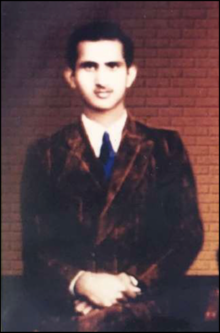Abdul Qadir Sanjrani
Abdul Qadir Sanjrani | |
|---|---|
| عبدالقادر سنجراٹي | |
 | |
| 5th Minister of Finance | |
| In office 9 June 1962 – 15 December 1962 | |
| President | Ayub Khan |
| Preceded by | Muhammad Shoaib |
| Succeeded by | Muhammad Shoaib |
| Minister of Commerce | |
| In office 28 May 1962 – 8 June 1962[1] | |
| Preceded by | Md. Hafizur Rahman |
| Succeeded by | Wahiduzzaman |
| Personal details | |
| Born | Shahpur Chakar, Sindh |
| Parent |
|
Abdul Qadir Sanjrani (Sindhi: عبدالقادر سنجراٹي) was a Pakistani politician from Shahpur Chakar, Sindh. He served as 5th Finance minister of Pakistan,[2] Health, Social Welfare, Basic Democracies and Local Government minister of West Pakistan.[3][4] He also served as Pakistani ambassador to Kenya.[5]
Politics
[edit]He was elected as Member of Provincial Assembly of Sindh in 1970 elections contesting from PS-41 Sanghar at ticket of PML-Q defeating the future CM of Sindh Jam Sadiq Ali's brother, Jam Anwar Ali.[6][7]
Pir Pagaro started to participate in politics during the Ayub era. He was also a personal friend of President Ayub Khan. During his era, Pir Pagara managed to get cabinet positions for Mohammad Khan Junejo and Abdul Qadir Sanjrani.[8]

Family history
[edit]Abdul Qadir Sanjrani’s father, Ali Murad Sanjrani K.S, Haji, was a Zamindar (landowner) and factory owner. Ali Murad was born in 1895 in his native village of Barhun. Fluent in Sindhi and Seraiki, he belonged to the prominent Sanjrani tribe, originally from Dera Ghazi Khan, Punjab. The tribe migrated during the Kalhora dynasty of Sindh and settled in their current village. He was awarded title of Khan Sahib in 1930s.[9] He was also Chairman of Farmer Organization.[10]

One of Ali Murad’s ancestors served as a commander in the Talpur dyansty army and fought in the Battle of Dubbo in 1843. Ali Murad’s father, Lal Baksh Khan Sanjrani, held the position of Commissioner’s Darbari and was also a member of the District Local Board.[11]

References
[edit]- ^ "PRESIDENTIAL CABINET" (PDF). Cabinet Division - Government of Pakistan. Retrieved 1 August 2023.
- ^ Hayat, Usman (2017-12-25). "Why Pakistanis do not love finance ministers". Dawn.com. Retrieved 2021-01-08.
- ^ "SPEAKER". Pap.gov.pk. Retrieved 2021-01-08.
- ^ West Pakistan Year Book. West Pakistan. Public Relations Department. 1962.
- ^ "United Nations Environment Programme - UN Digital Library" (PDF). Digitallibrary.un.org.
- ^ "PS-41 Sanghar Election 1970 Full Result Votes Sindh Assembly". Electionpakistani.com.
- ^ "Archived copy" (PDF). Archived from the original (PDF) on 2016-08-06. Retrieved 2022-06-01.
{{cite web}}: CS1 maint: archived copy as title (link) - ^ United States Joint Publications Research Service (1986-09-09). Near East/South Asia Report. Internet Archive.
- ^ "DR PATHAN - Notes". drpathan.com. Retrieved 2024-11-11.
- ^ http://sida.org.pk/download/sdc/LIST%20OF%20FARMERS%20ORGANIZATIONS%20AND%20PROFILE%20OF%20CHAIRMAN.pdf
- ^ Biographical Encyclopedia of Pakistan. Biographical Research Institute, Pakistan, for International Publishers (Pakistan). 1972.
